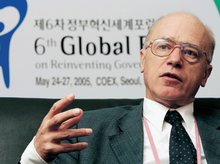Hans Köchler
| Hans Köchler | |
|---|---|

Hans Köchler
|
|
| Born |
18 October 1948 Schwaz, Tyrol, Austria |
| Era | 20th-century philosophy |
| Region | Western Philosophy |
| School | Phenomenology Existential philosophy Continental philosophy |
|
Main interests
|
Hermeneutics Philosophy of law Political philosophy Philosophical anthropology |
|
Notable ideas
|
Transcendental realism Dialectic of power and law Cultural self-comprehension |
Hans Köchler (born 18 October 1948) is a retired professor of philosophy at the University of Innsbruck, Austria, and president of the International Progress Organization, a non-governmental organization in consultative status with the United Nations. In his general philosophical outlook he is influenced by Husserl and Heidegger, his legal thinking has been shaped by the approach of Kelsen. Köchler has made contributions to phenomenology and philosophical anthropology and has developed a hermeneutics of trans-cultural understanding that has influenced the discourse on the dialogue of civilizations, particularly as regards the relations between Islam and the West. His research in political and legal philosophy—combined with his involvement with the UN—has resulted in a fundamental critique of the state-centered international system and in specific proposals for the democratization of the United Nations Organization and for a viable system of international criminal justice.
In his student years, Hans Köchler was actively involved as a Board Member of the European Forum Alpbach and established contacts with leading European intellectuals and philosophers such as Manès Sperber, Hans-Georg Gadamer and Rudi Supek of the Praxis school who he invited to his lecture series that he organized from 1969 onwards. At the beginning of the 1970s, he had joined the team around Otto Molden, the founder of the European Forum Alpbach. These were his formative philosophical years; he initially developed an interest in existential philosophy, transcendental philosophy and phenomenology. In particular, he undertook an epistemological critique of Husserl's transcendental idealism] and interpreted Heidegger's philosophy of Being in the sense of social critique, opening up—in the Cold War era—a dialogue with humanist philosophers of the Praxis school in Yugoslavia and in Czechoslovakia. As a doctoral student, he also had met in Alpbach with Ernst Bloch, Arthur Koestler and Karl Popper.
...
Wikipedia
